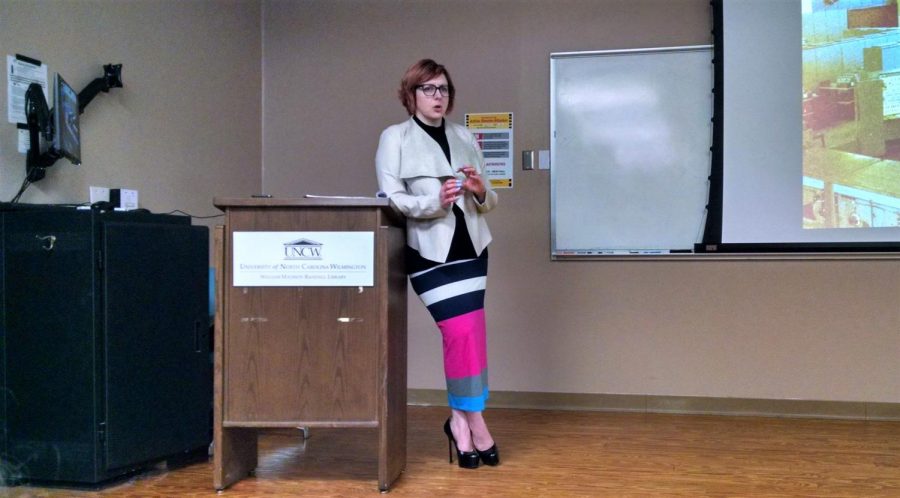Department of History hosts Marie Hicks lecture
Marie Hicks delivers their lecture “Prehistories of Bias in Computing” at Randall Library on Thursday, Feb. 22.
On Thursday night, UNC Wilmington’s Department of History hosted Marie Hicks, who delivered a lecture about how the computer algorithms we trust to make our world better and more equal have always been inadvertently reinforcing an unequal system.
The lecture brought up the often-hidden history of computers, in which women dominated the field until it was considered “too serious” for them to handle.
Entitled “Prehistories of Bias in Computing,” focused on the history of exclusion and biases in the tech narrative and how they still affect us today. Hicks, an associate professor of History of Technology at the Illinois Institute of Technology, provided a survey of the history of technology in Britain, though it had its fair share of resemblance to its American counterpart.
Hicks based much of their lecture from their book, “Programmed Inequality: How Britain Discarded Women Technologists and Lost Its Edge in Computing,” and another publication they are currently working on. Both works focus on the interactions of women, transgender people, and nonbinary people with technology and computer algorithms as the field began to grow after WWII.
Through the lecture, told of the true history of programming. All code writing was done by hand, before being checked and fed into the computer. Most, if not all, program writers were women when computing was still new, as the laborious task of writing out all the code was seen as unskilled labor by a predominately male job market. But this gendering of computing would soon flip once those in power (also mostly male) realized that computers were where the power of the future was held.
Many women were pushed out of the field once they were married, and such was the case of Stephanie “Steve” Shirley, an English programmer Hicks spoke of at length during the lecture. However, Shirley refused to remain in retirement and created what we would consider one of the first software start-up companies.
According to Hicks, Shirley, who would often go by the nickname Steve, would sign off on query messages to potential customers by this name as well. Shirley did this because she found she was able to acquire contracts and projects more easily when passing herself off as a male programmer.
Hicks would go on to explain that there is a “long history of algorithmic bias and it’s built up momentum.” They discussed more modern instances of bias in computing and technology, such as the recent scandal with Amazon’s recruiting software that discarded resumes containing phrases like “Women’s Chess” or “Women’s Varsity Softball.”
In discussing the relative lack of diversity in technology-driven fields, Hicks clarified that this occurrence is not for lack of talent, but rather an expression of power by a dominant group. By keeping out those seen as ‘other,’ the dominant group is able to retain and dictate the power that controls the rest.
Such a frank look at the history of computers and how it still affects our interactions with technology today garnered several shocked reactions:
“The story of how Stephanie “Steve” Shirley had to pretend to be a man to get programming contracts stuck with me,” said Dylan Williams, a UNCW freshman who attended the lecture. “While it is refreshing to see someone beating the system, it does raise the question as to why she had to jump through that hurdle in the first place.”
Jenna Pugliese-McNamara, a junior, agreed with Williams and said, “I find it incredibly scary that when I graduate, I have to work harder than men for the same thing and that there is such a systematic discrimination in practice in the most unlikely of places.”










